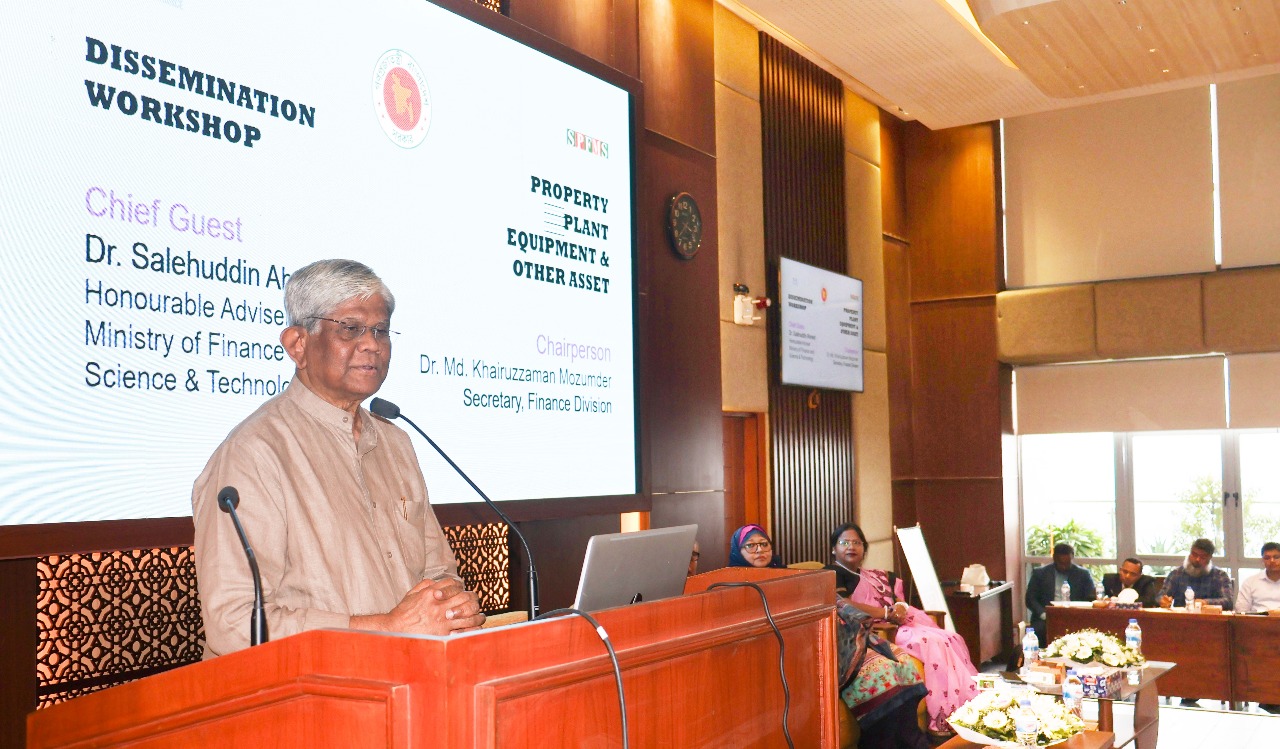The interim government on Thursday introduced the country’s first policy and procedures manual for property, plant and equipment, as well as lease for state-owned enterprises (SoE) and autonomous bodies.
The manual has been developed in line with global standards for proper valuation and management of their assets.
It would help offset liabilities to the tune of Tk6.5 trillion (lakh crore), considered as contingent liabilities of the government, said Finance Adviser Salehuddin Ahmed at the manual-launching event at the secretariat.
Contingent liabilities are potential liabilities in a fluid situation that may trigger in any future adverse event. For instance, if state firms and bodies themselves fail to clear liabilities, the government as the owner will ultimately have to shoulder these responsibilities.
The asset manual was unveiled at a workshop hosted under the Scheme on Strengthening SOE Governance under the Strengthening Public Financial Management Programme to Enable Service Delivery.
Speaking at the event, Salehuddin said, “This initiative of maintaining a comprehensive asset register will transform how public assets are managed – by ensuring uniformity, transparency, enhancing efficiency, and reducing financial risks.”
Echoing the same, Mohammad Muslim Chowdhury, former comptroller and auditor general, told TIMES of Bangladesh that most of the SoEs and autonomous bodies do not maintain proper accounting of their assets, thereby depriving them of enjoying current fair values.
Lands acquired decades ago are far pricier now. On the flip side, machinery and equipment lose fair value gradually due to depreciation, he explained. Lack of proper accounting practices that demand timely revaluation of the assets suppressed their book value significantly.
Years gone by, asset revaluation did not take place in most of the government organisations, Chowdhury pointed out.
“I do not have exact numbers. But I am hopeful, with proper accounting, the vast land, buildings and other infrastructure owned by SoEs and autonomous bodies together would get a fair value higher than their liabilities,” said Chowdhury.
This is all about their balance sheet that may help show the entities healthy enough to operate. But they need massive reforms to avert repetition of liabilities accumulation in future, and it will demand professionalism and operating efficiencies not less than a private enterprise, he said.
The growth seeking state can significantly boost its fiscal books by strengthening the SoEs, divesting their stakes to investors as seen in most countries including neighbouring India, added Chowdhury.
Proper revaluation of SoE and autonomous body assets would help improve their commercial credit ratings that result in lowering borrowing costs, boost investor confidence in them, said Finance Division Secretary Md Khairuzzaman Mozumder while speaking as the session chair.
Finance Ministry joint secretaries Amirul Islam and Firoz Ahmed in their detailed presentation said the new policy serves as a structured guide for managing long-term tangible and leased assets—covering land, buildings, machinery as well as intangible assets like software and intellectual property.
It defines classification methods, valuation techniques, and detailed processes for depreciation, disposal, revaluation and impairment.
According to them, the policy sets a capitalisation threshold so that only assets meeting specific cost and useful life criteria are recorded, with Finance Division approval required for expensing items over Tk50,000.
A key feature of the manual is the requirement for an up-to-date Fixed Asset Register, recording purchase date, cost, depreciation rate, identification details and location.
It distinguishes between capitalising and spending costs, allowing only directly attributable expenses – such as purchase price, delivery, installation and legal fees – to be included in asset valuation.
On lease management, the manual aligns with international standards, setting criteria for classifying finance leases and operating leases.
Finance leases—covering contracts over 12 months and valued more than Tk500,000 – must recognise right-of-use assets and lease liabilities, while operating leases are expensed over their term.
The guidelines also address depreciation or amortisation methods, discount rate calculations, and maintenance responsibilities for leased assets.
Finance Division officials noted that the manual will strengthen compliance, improve the accuracy of financial reporting, and support more informed decision-making in the public-sector asset management.
By standardising procedures nationwide, it aims to reduce irregularities, enhance accountability and ensure optimal utilisation of public resources, said the officials.
Bangladesh has around 400 SoEs and autonomous bodies and other than a handful, including dozens of for-profit firms, all have long been depending on state subsidies to continue.
Having no private sector competitors, only the government companies in fuel and power distribution, international bandwidth operations, and a few rare manufacturers make money as they depend on a protected market.
On the other hand, most of the state-owned lenders are in a bad shape due to bad loans.
Experts stress a massive overhaul of SoEs, including 49 non-financial ones, to end the legacy of their dependency on taxpayer’s money.
The interim government eyes the transformation as its broader economic reform plan.
Some 50 SoEs have been identified for structural overhauling so they can go public in the coming years, a senior finance ministry official told the TIMES.
Stock market analysts, however, stressed a real reform including the management culture so that firms don’t deprive investors of long-term value creation through their businesses.
The entire shift would need a strong political will as well as cooperation from the firms’ employees, said Mohammad Muslim Chowdhury.


